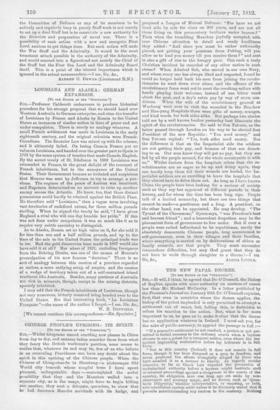THE NEW PAPAL DECREE.
[To ran EDITOR OF TIIR "EIPRCTATOR."1 SIR,—It will, I think, be agreed that Dr. O'Donnell, the Bishop of Raphoe, speaks with more authority on matters of canon law than Mr. Michael McCarthy. In a letter published by the Freeman's Journal on January 10th Dr. O'Donnell explains, nest, that even in countries where the decree applies, the bishop of the priest impleaded is only permitted to attempt a settlement out of court, but, failing this, is forbidden to refuse his sanction to the action. But, what is far more important to us, he goes on to make it clear that the decree has no application whatever in Ireland. I must ask you, for the sake of public accuracy, to append the passage in full :— "If a peaceable settlement be not reached, a prelate is not per- mitted to forbid recourse to the ordinary courts when a layman chooses to sue a priest for a temporal matter, oven where the law against imploading ecclesiastics before lay tribunals is in full force.
"Rub in this country (Ireland) it does not remain in full force, though it has been designed as a prop to freedom, and never produced the effects wrongfully alleged by thoso who have assailed it as a, menace to liberty. As regards secular concerns, so far as Canon Law required the permission of ecclesiastical authority before a layman might institute civil or criminal proceedings against a clergyman in the courts of the country, its obligation hero was long ago set aside by non- observance and contrary usage; and no decree, such as (luau- tavis Diligentia,' whether interpretative, or enacting, or both, sets estabhshed custom aside unless it be distinctly stated that it prevails notwithstanding any custom to the contrary. Nothing
of this kind is intimated in the recent clietu Proprio! Consequently it leaves things with us just as they were before its publication in the matter of summoning clergymen to take their trial on temporal issues in the ordinary courts of justice."
I have only to add that Dr. O'Donnell before he was made a bishop was Professor of Canon Law at Maynooth.—I am, Irish Press Agency, 2 Great South Street,























































 Previous page
Previous page